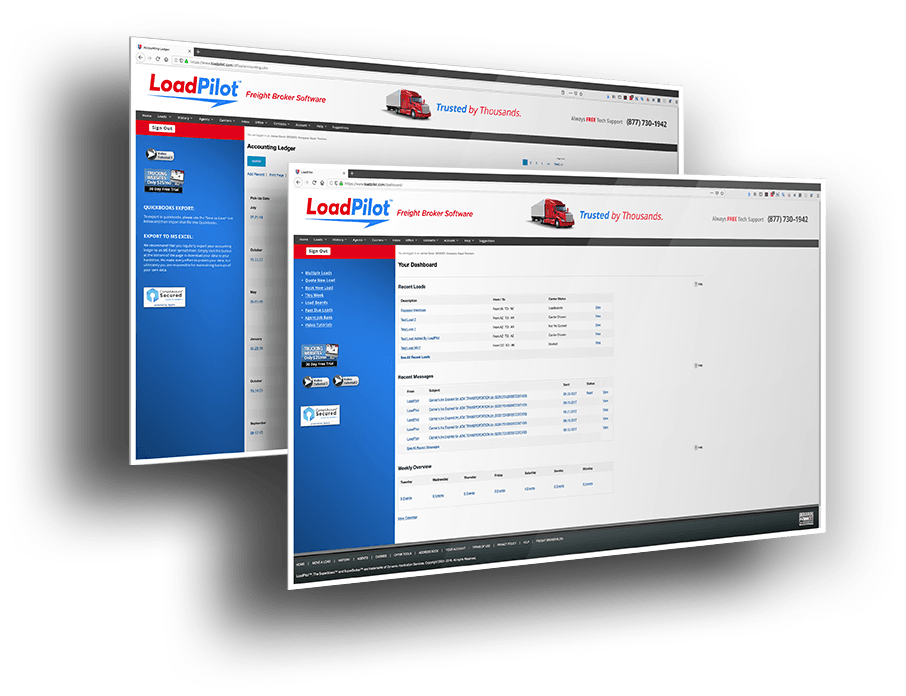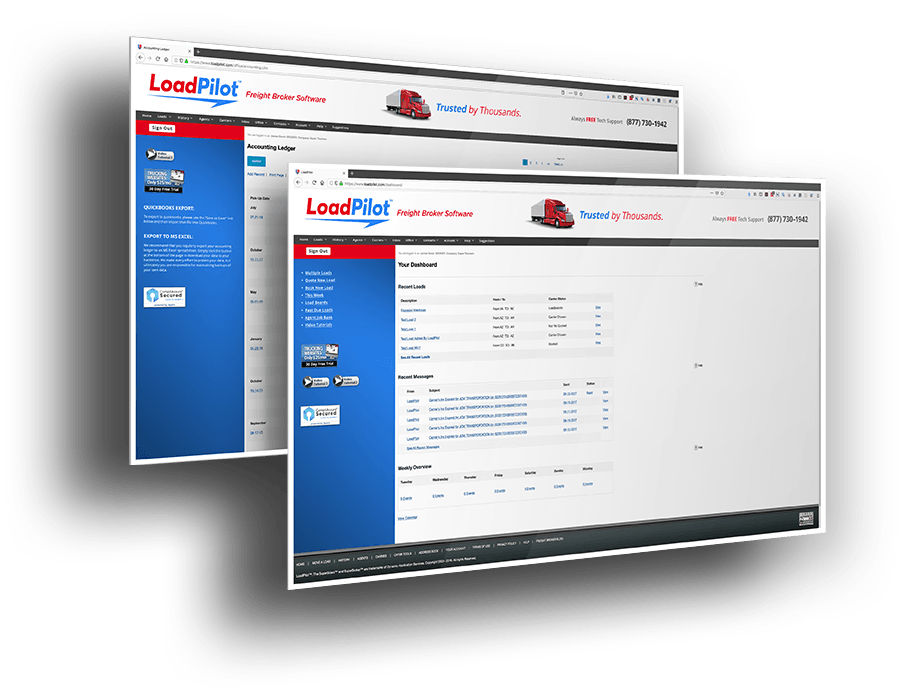As we roll into 2024, the freight and trucking industry is undergoing significant transformations, driven by technological advancements, regulatory changes, and global economic shifts. In this blog post, we’ll explore key trends and factors shaping the landscape of the freight and trucking sector in the United States and offer valuable insights for truckers and freight brokers to navigate the challenges and opportunities that lie ahead.
The Digital Revolution Accelerates
The digital revolution has been making waves in the freight industry, and 2024 is expected to witness even greater strides in digital transformation. Automated systems, artificial intelligence, and blockchain technology will play pivotal roles in streamlining operations, reducing costs, and enhancing overall efficiency. Let’s delve into the specifics:
Technology Integration
One of the most prominent changes in the trucking industry is the widespread integration of technology. The implementation of advanced telematics, Internet of Things (IoT) devices, and Artificial Intelligence (AI) is reshaping how trucks operate and how freight is managed. The rise of autonomous vehicles, predictive maintenance, and real-time tracking are becoming indispensable components of the modern trucking ecosystem.
Embrace technology by staying updated on the latest advancements. Familiarize yourself with electronic logging devices (ELDs), route optimization apps, and maintenance monitoring systems to enhance efficiency and compliance.

Electric and Sustainable Trucks
The push for sustainability has reached the trucking industry, with a growing emphasis on electric and environmentally friendly vehicles. As governments globally tighten emission regulations, companies are increasingly investing in electric trucks to reduce their carbon footprint.
According to the US Department of Transportation, the number of electric trucks on American roads is expected to grow by 15% annually over the next five years.
Stay informed about charging infrastructure developments and explore incentives for adopting electric vehicles. Adapting to eco-friendly practices not only aligns with industry trends but also positions you favorably in a rapidly changing market.
Supply Chain Resilience
The freight and trucking industry has experienced disruptions in recent years, from the COVID-19 pandemic to geopolitical tensions. Companies are now prioritizing supply chain resilience, seeking ways to minimize vulnerabilities and enhance adaptability.
The American Trucking Association reports that 71% of freight in the US is moved by trucks, underlining the critical role the industry plays in maintaining a robust supply chain.
Diversify your network of carriers to mitigate risks associated with disruptions. Consider incorporating technology solutions that provide real-time visibility into shipments, enabling proactive decision-making in the face of unforeseen challenges.

Regulatory Changes
Regulatory changes are a constant in the trucking industry, impacting everything from safety standards to hours of service regulations. Staying abreast of these changes is crucial for both truckers and freight brokers to ensure compliance and avoid potential penalties.
The Federal Motor Carrier Safety Administration (FMCSA) regularly updates regulations. Truckers need to be aware of changes in areas such as electronic logging, drug and alcohol testing, and safety protocols.
Regularly review regulatory updates and invest in training programs to keep your team well-informed. Compliance not only ensures legal adherence but also contributes to overall industry safety.
Driver Shortage Challenges
The trucking industry is grappling with a persistent driver shortage, which is expected to worsen in the coming years. Factors such as an aging workforce, demanding lifestyle, and stringent regulations contribute to this challenge.
The American Trucking Association estimates a shortage of over 60,000 drivers in the United States, with projections suggesting this number could reach 160,000 by 2028.
Consider initiatives to improve driver retention, such as offering competitive salaries, flexible schedules, and investing in driver wellness programs. Creating a positive work environment can contribute significantly to reducing the impact of the driver shortage.

E-Commerce Boom
The surge in e-commerce has had a profound impact on the freight and trucking industry. With more consumers opting for online shopping, there’s an increased demand for efficient last-mile delivery services.
According to the US Census Bureau, e-commerce sales in the United States increased by 14.7% in 2023, underscoring the ongoing shift in consumer behavior.
Capitalize on the e-commerce boom by establishing partnerships with retailers and e-commerce platforms. Efficient and reliable last-mile delivery services are increasingly becoming a competitive advantage in the industry.
Future-Proofing Your Logistics: The TMS Power
As we navigate the future of the US freight and trucking industry in 2024, here are some actionable tips backed by industry trends and statistics:
Embrace Technology Training
A survey by Supply Chain Dive found that 63% of logistics professionals believe that technology training is crucial for adapting to industry changes.
Invest in training programs that familiarize your team with the latest TMS platforms and technologies. A workforce well-versed in digital tools is essential for leveraging the full potential of automation and streamlining operations.

Stay Informed about Regulatory Changes
A report by the American Transportation Research Institute states that 79% of motor carriers consider staying informed about regulatory changes as the most critical compliance-related issue.
Regularly update your knowledge about industry regulations and ensure that your TMS is equipped to handle compliance seamlessly. Being proactive in staying informed can save your business from costly penalties.
Collaborate for Sustainability
A study by the SmartWay Transport Partnership found that companies participating in sustainability collaborations reduced their carbon footprint by an average of 28%.
Explore partnerships with carriers and suppliers that share your commitment to sustainability. TMS platforms can facilitate collaboration by providing a centralized platform for communication and data sharing.
Leverage Data for Strategic Decision-Making
According to a survey by Accenture, 76% of supply chain executives believe that analytics and big data are essential for managing supply chain disruptions.
Use analytics tools to extract meaningful information that can inform strategic decisions. Whether it’s optimizing routes, managing inventory, or forecasting demand, data-driven decision-making is a cornerstone of success.

Prioritize User Experience
A study by Nielsen Norman Group found that a well-designed user interface could increase user productivity by up to 83%.
When choosing a TMS platform, prioritize user experience. A system that is easy to use and navigate will enhance productivity and reduce the learning curve for your team.
Test and Iterate
According to a report by PwC, 69% of supply chain leaders believe that continuous testing and improvement are essential for successful supply chain operations.
The freight industry is dynamic, and what works today may need adjustments tomorrow. Regularly assess the performance of your TMS, gather feedback from users, and be willing to iterate and adapt to changing needs.
Navigating the Future Together
As we step into 2024, the freight and trucking industry is navigating a dynamic landscape shaped by technological innovations, sustainability initiatives, supply chain resilience, regulatory changes, and the ever-present challenge of the driver shortage. Truckers and freight brokers can position themselves for success by embracing technology, adapting to sustainable practices, prioritizing supply chain resilience, staying abreast of regulatory changes, addressing the driver shortage, and capitalizing on the e-commerce boom.
This year, he role of TMS platforms cannot be overstated. These digital tools are not just about efficiency; they are about empowering professionals to navigate the complexities of a rapidly evolving landscape. By embracing technology, sustainability, and regulatory compliance, professionals in the freight industry can not only meet the challenges of 2024 but thrive in an era of unprecedented innovation and change.
The road ahead may be challenging, but with proactive strategies and a commitment to embracing change, the freight and trucking industry in 2024 holds promising opportunities for those willing to navigate the twists and turns with resilience and innovation



